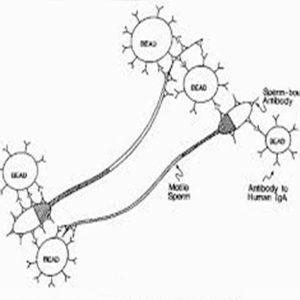Anti-Sperm Antibodies (ASA) Test

In the human body activated B-cells of the immune system synthesize and secrete antibodies, whose function is to attack pathogenic microorganisms. In order to carry out this function effectively, our immune system has mechanisms of differentiating between the body’s own cells and foreign cells. When these mechanisms do not work properly, the immune system starts attacking the body’s own cells. An example of such a situation is the presence of anti-sperm antibodies in the male or the development of an autoimmune disease, such as rheumatoid arthritis.
The presence of anti-sperm antibodies above a certain level in seminal plasma or in serum has a negative
effect on fertility. One of the reasons for this is a phenomenon known as agglutination, whereby antibodies bind to spermatozoa, immobilize them and make them clump together, thus rendering them unable to reach the oocyte and fertilize it.
The presence of anti-sperm antibodies in the cervical mucus or the serum of the female partner, on the other hand, impedes the penetration of spermatozoa through the cervical canal, which can also lead to infertility.
Indications for the ASA Test
Elevated levels of anti-sperm antibodies are more common in men than in women. They result from a breach of the blood-testis barrier, which makes the testes an immunoprivileged site. The causes for such a breach can be numerous:
- Surgical intervention, e.g. vasectomy, corrective surgery for varicocele, etc.
- Testicular torsion (a twisting of the spermatic cord, which compromises blood supply to the testis)
- Infection, resulting in orchitis or prostatitis
- Cryptorchidism (a failure of one or both testes to descend into the scrotum)
- Testicular cancer
as well as anything else leading to inflammation in the genitalia and the urogenital tract.









